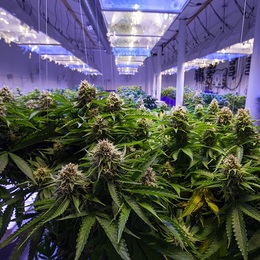
Marijuana sales to adults 21 and older officially began in New Jersey in April 2022, more than a year after Gov. Phil Murphy signed a bill to legalize recreational cannabis. As experts continue to examine this budding industry, its impacts and its potential, many attest to the fact that it is continuing to expand for the furtherance of the economy, as well as for the community.
Initially, some townships hesitated to open dispensaries pending the progress of the industry. Now that municipal economies have seen positive payoffs, new dispensaries are popping up at a comparatively more rapid rate. While prices might be higher and fewer consumption options are offered than states with a longer history of recreational availability like California, Washington and Colorado, New Jersey is quickly evolving—and even serving as a roadmap for other states to follow. The market is still relatively new on the East Coast, where New Jersey is a pioneer.
Deptford Mayor Paul Medany was one of the first to permit recreational dispensaries in his township during the initial, experimental phase, setting an example for other municipalities to follow. One result, he’s found, is an additional boost for nearby, non-cannabis-related businesses.
“It’s a regional draw. It’s not the customer base only in Deptford Township. We’re always looking to bring in folks besides Deptford Township residents to the mall area. … [Online shopping] really hurt us during COVID, so it boosted the local economy—it brings in a variety of customer bases. They use businesses right there in the strip mall for the cannabis store, and then they go across the street to the mall,” he says.
New Jersey embraced medical marijuana legalization in 2010, with increasing legislation leading toward the recreational market today, which experts agree has enhanced the local economy and tourism. As research continues to demonstrate the medicinal benefits of marijuana use, the stigma originally associated with it appears to be diminishing—at least in The Garden State—as people from all walks of life are seeing their pain alleviated without the risks they’ve previously encountered with pharmaceutical options. Experts in the field noted a surplus of veterans who have benefited from marijuana, demonstrating its medical success in the most extreme cases of physical or mental pain.
“Factually speaking [and] scientifically speaking, cannabis is healthy. … Rather, it’s a healthier alternative to things like alcohol, for recreation purposes, or opioids and benzos for medication purposes,”says Scott Rudder, founder and president of New Jersey CannaBusiness Association. “So, people are putting down the bottle, they’re putting down the pills; they’re using cannabis to both medicate and recreate. It’s a very positive thing that these options are now available. I think as more of these dispensaries start to open up around the state, people are becoming more informed, more educated and they’re starting to make healthier choices,”
Rudder adds that teenage use is steadily declining, as the perception of marijuana has developed into one of health and wellness in recent years. While it is considered that the packaging and flavors might appeal to minors, safety precautions like child-resistant packaging have been enforced. Products such as cannabis-infused drinks and confectionaries are delayed because of the additional steps toward regulation. This is a part of the NJ Cannabis Regulatory Commision’s (CRC) “Safe Cannabis Consumption Education Campaign.”
“There are stigmas and stereotypes that are generationally based. A lot of my peers view cannabis from their teenage years … or they view cannabis from movies like Fast Times at Ridgemont High or Cheech and Chong [films]. The stereotypical ‘stoner’ that you see in the movies is slow, weighted and things like that—that’s a negative perception. In fact, there are doctors, lawyers, teachers, CPAs and all these other professions that are out there right now who are active cannabis consumers,” Rudder says.
“Consumers have really been in the closet and it’s based on stigmas and stereotypes—not the facts, not the science, but stigmas and stereotypes. The more people starting to see an older woman with Parkinson’s disease using cannabis, the child down the street who has a severe seizure disorder using it, people with migraines using it, their neighbors having fun and just relaxing with it, we’re starting to see the stigmas and stereotypes start to dissipate,” adds Rudder.
Ken Wolski, RN, MPA, executive director of the Coalition for Medical Marijuana-New Jersey (CMMNJ), discussed the country’s long history of misinformation and fear tactics perpetuated by conflicting interests that profited from cannabis prohibition despite the confirmed dangers of alcohol, cigarettes and prescription drugs. He explained how the groundbreaking scientific discovery that marijuana could be used medicinally in the early ’90s was not further explored, as society was not yet open to it at the time. He decided to begin advocating for patients and decrying the strict penalties that so many of them were facing for simply treating their pain.
“We encouraged patients to come forward and tell their stories in their own words to legislators about how marijuana helped them when nothing else could,” Wolski says. “These patients waived their confidentiality and told intimate details of their sufferings that, in many cases, were only compounded by pharmaceutical drugs. Seeing children having their seizures controlled by marijuana when nothing else worked for them went a long way toward removing the stigma associated with marijuana use. Seeing other vulnerable members of society, like hospice patients, cancer patients and AIDS patients getting stronger and improving their quality of life by using marijuana went a long way toward removing the stigma associated with it.
“Clearly marijuana is a safer alternative to alcohol, most prescription drugs and even many over-the-counter drugs. More and more people now have the direct experience of using the substance themselves or knowing loved ones who do. The fastest-growing demographic of marijuana users in the United States right now is senior citizens. This is because marijuana helps with many of the typical problems associated with aging better than any other drug available. These problems include chronic pain, insomnia, anxiety, and the grief of seeing friends and loved ones die,” he concludes.
Another initial complication with medical-only legalization was its accessibility to only those who could afford doctors’ visits, medical card fees and transportation to dispensaries. Patients also still lack rights to access medical cannabis in hospitals, nursing homes and state institutions. According to Wolski, CMMNJ’s goals for medical cannabis in 2023 are “insurance coverage, home cultivation rights, hospital and institutional access and expanded qualifying conditions.”
Taking the step beyond legalized medical marijuana to full protection of adult use in New Jersey was also necessary to prevent minimal possession charges from ruining lives with hefty fines or incarceration, especially toward marginalized members of the community who are proven to be the most adversely affected. Now that marijuana is fully accessible to those who are of age, the CRC’s Executive Director Jeff Brown affirms that efforts in the near future will implement more convenience. More importantly, there are plans to use this economy-boost to help disproportionately affected New Jersey residents.
“There are three new license classes that [opened up in September],” Brown explains. “Those include delivery services, wholesale licenses as well as distributor licenses. … We are prioritizing social equity businesses specifically, so for the first three months, only social equity businesses will be able to submit—and those are businesses that are owned by either people with past marijuana convictions or who come from living in an economically disadvantaged area. After those first three months, then that opens up for diversity-owned businesses. That includes minority-owned businesses, disabled veteran-owned businesses and women-owned businesses. And then after six months, anybody who wants to can apply. But we’re very excited to open up for those new licenses. Those will create new opportunities for entrepreneurs looking to get into this business.”
In developing his own dispensary in Riverside, Rudder has witnessed the industry from both sides. In addition to costs expected for any business to begin operation, he explains dispensary operators are subject to further hurdles during the process such as finding a bank or insurance company that will work with them. Rudder also ascertains that dispensaries are increasingly becoming regular implements in the community like any other local business. As the stigma continues to minimize, he also anticipates a new receptiveness from banks that would streamline the process for prospective dispensary owners to obtain loans to finance equipment and supply, among other factors. Unlike the past, however, dispensary owners no longer have to store profits on-site as banks have begun to account for cannabis-related businesses with marijuana-specific banking services despite its illegal status federally.
While cultivators and manufacturers cannot be selected from out-of-state, the initial somewhat-barren selection has grown to dozens of options for which dispensaries can partner. As regulation solidifies, there is definite potential for the industry to explore food and alcohol licensing for cannabis-infused edibles beyond gummies, drops and lozenges. Digestible cannabis is a progressive method so that patients who are not advised to inhale smoke can still receive the medical benefits.
Nevertheless, the cannabis industry continues to meet the needs of dispensary owners, patients and recreational users—without neglecting to consider each group individually. It is a steady process that requires a longer timeline for unprecedented territory in the history of the state, equating to a landmark change toward the future.
Click here to subscribe to the free digital editions of South Jersey Magazine
To read the digital edition of South Jersey Magazine, click here.
Published and copyrighted in South Jersey Magazine, Volume 20, Issue 8 (November 2023)
For more info on South Jersey Magazine, click here.
To subscribe to South Jersey Magazine, click here.
To advertise in South Jersey Magazine, click here.












